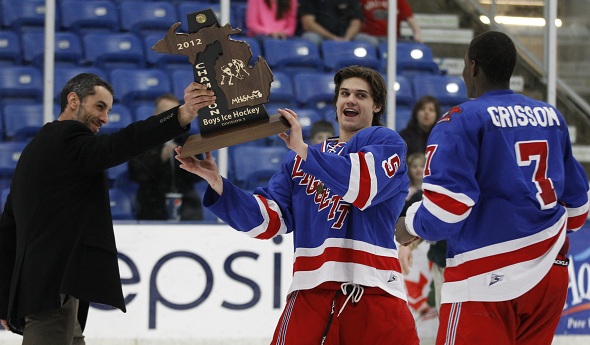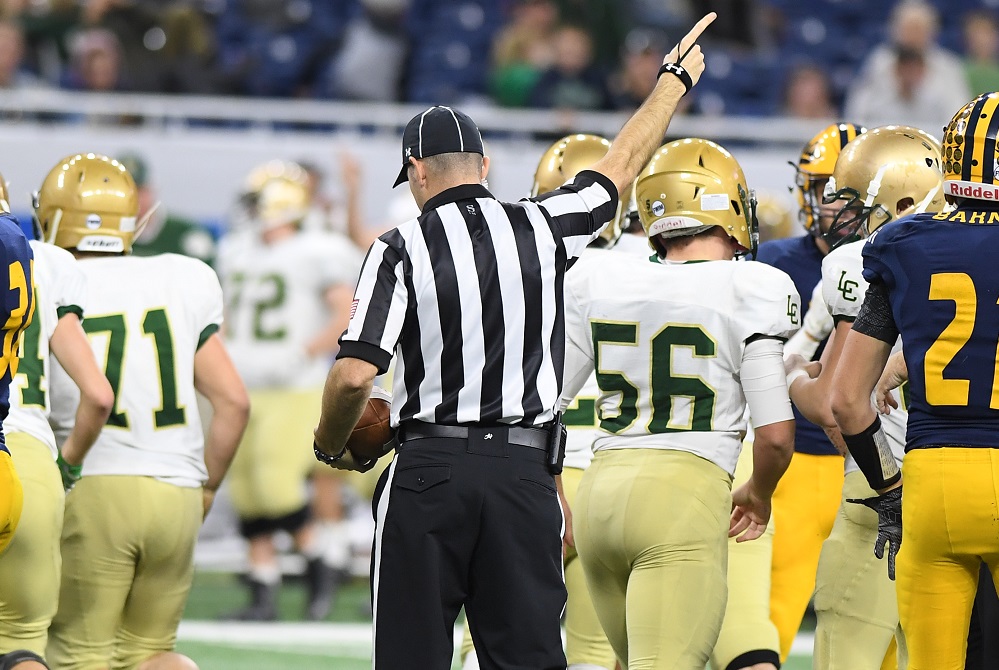
A Narrower Scope to Target New Officials
October 12, 2012
By Rob Kaminski
MHSAA benchmarks editor
Several years ago, MHSAA schools received thousands of postcards imploring graduating student-athletes to “Stay in the Game” by registering as contest officials.
A miniscule portion of that quantity found its way back to 1661 Ramblewood Drive. It’s a better bet you are reading this issue of benchmarks on the rest, in the form of recycled paper.
The plan for 2012-13, then, was to move away from the mass marketing approach and narrow the scope with the help of school administrators. Each MHSAA member school athletic director was sent a memo last May, along with two registration invitations. The memo simply asked the ADs to identify two officiating candidates from the senior class and deliver the special registration form. Completed forms were returned to the MHSAA, which not only waived all sign-up fees for the student’s first year, but also set the rookies up with local associations and training opportunities.
“We took this approach as a more measured strategy knowing that officiating is not for everyone,” said MHSAA Assistant Director Mark Uyl. “Instead of marketing to everyone, we hoped that ADs would give serious time and thought in selecting two graduating seniors who seemed best equipped in terms of personality and comportment for officiating.”
 Uyl set a modest goal of attracting 50 new officials through this program, and the Association is nearly halfway there at this printing, as 22 young men and women will make their first calls during the 2012-13 season.
Uyl set a modest goal of attracting 50 new officials through this program, and the Association is nearly halfway there at this printing, as 22 young men and women will make their first calls during the 2012-13 season.
Or, at least their first calls at the high school level. One of the “rookies” is Jake Hodges, who co-captained Grosse Pointe Woods University Liggett to the 2012 MHSAA Division 3 Ice Hockey title.
“I have been a USA Hockey ref for six years, and I plan to continue in college. It is good income,” said Hodges, who also plans to work lacrosse. “I had planned to register anyway so the free registration was great. I expect to work often and continue to be a solid ref. I also played lacrosse for four years and think that will allow for a good transition.”
The process has culled candidates from Michigan’s cities, suburbs and rural areas, from below and above the Mackinac Bridge.
“I have always been interested in officiating. The biggest incentive was the free registration,” said Negaunee’s Kevin Price, who registered in baseball, softball and basketball. “I hope this year will be a learning experience as I work games with long-time officials. As a player, I got to know many officials and we have become friends. The local officials in my area have done a great job giving me advice on my upcoming ‘rookie’ season.”
Many students registered for more than one sport, with a high of seven sports for Montrel Hill of Melvindale.
Early returns give Uyl and the MHSAA reason for optimism.
“We will continue this incentive plan again next year as we try to grow the pool of new, young officials,” Uyl said.
PHOTO: Jake Hodges (center) hoists the MHSAA Division 3 championship trophy after his Grosse Pointe Woods University Liggett team claimed the title in March.
NOTE: This is the third installment in the series "Making – and Answering – the Call" detailing the careers and service of MHSAA officials. Click the links below to view the two.

Be the Referee: Pass Interference
By
Geoff Kimmerly
MHSAA.com senior editor
September 2, 2021
This week, MHSAA officials coordinator Sam Davis explains the differences in high school pass interference rules from those at the college and pro levels.
Be The Referee is a series of short messages designed to help educate people on the rules of different sports, to help them better understand the art of officiating, and to recruit officials.
Below is this week's segment – Pass Interference – Listen
One of the big differences between high school football and the college or pro game is how pass interference is called.
In high school, there is no such thing as an “uncatchable” pass. If there is illegal contact by the defender while the ball is in the air, that’s pass interference, no matter where the pass ultimately ends up.
Also – in high school – a defender can “face guard” as long as no contact is made with the receiver. That is not pass interference, even if the defender does not look back for the ball.
Both of those interpretations differ from the college and pro game. Both (of those) levels have an uncatchable exception, and neither allows for face guarding.
Keep that in mind the next time you think you’ve spotted pass interference at the high school level.
Previous editions
Aug. 26: Protocols and Mechanics – Listen

